For functional units, you can create intervals and generate inspections and orders programmatically to ensure ongoing maintenance.
You can manually create individual inspections for a functional unit, but not orders. Functional unit orders can only be generated by intervals.
Intervals
Intervals are sets of criteria that determine during what time(s) of the year and how often inspections or orders for a given functional unit must be completed. Intervals generate items (for example, an inspection or routine maintenance work) for employees in the field to complete.
Both inspection and order intervals for a functional unit are listed in the Standing Orders section on the functional unit's details page. Inspections or orders generated by the interval, as well as their current status, are listed in the Inspections and Orders sections, respectively.
You can see the interval associated with each order in the Type column in the Inspections section.
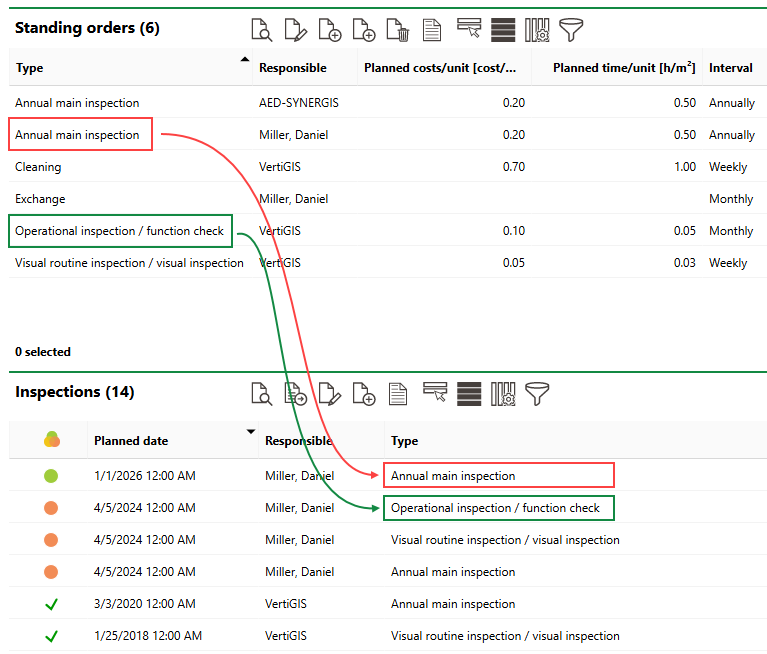
Interval and Associated Inspections for a Functional Unit
Manually created inspections and orders are not associated with an interval.
Create an Inspection Interval for a Functional Unit
To create an inspection interval for a functional unit, an entry that specifies how often the interval should generate inspections (for example, monthly, every 6 months, or annually) and the billing rate associated with the inspection must exist in the Type of Inspection catalog. You must also assign the functional a unit a service level property.
You can create an interval for a functional unit on the functional unit's details page.
To Create an Inspection Interval for a Functional Unit
1.Navigate to the details page for the functional unit for which you want to create an inspection interval.
2.Expand the Standing Orders section and click the Add Inspection (![]() ) icon.
) icon.

3.Click the > in the Type menu and select the template whose data you want to generate inspections based on. Selectable options are saved in the Type of Inspection catalog and contains the frequency associated with inspections generated by the interval (for example, annually or weekly) and the current billing rate (or tariff).
VertiGIS FM populates the Tariff field with the current billing rate for the entry selected in the Type field.
4.In the Responsible field, select the user to whom inspections generated by the interval should be assigned. By default, the user signed in to the application who is creating the interval is selected.
Refer to Inspection Interval Details for descriptions of all form fields.
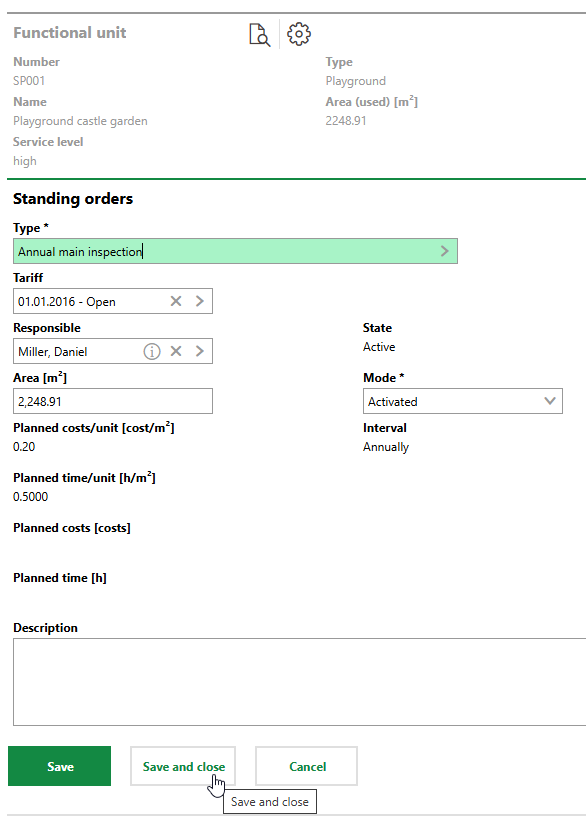
5.Review the information in the Standing Orders form and then click Save or Save and Close.
The new interval is now listed in the Standing Orders section on the functional unit's details page. If the interval's Mode property is set to Activated, inspections generated by the interval will appear in the Inspections section.
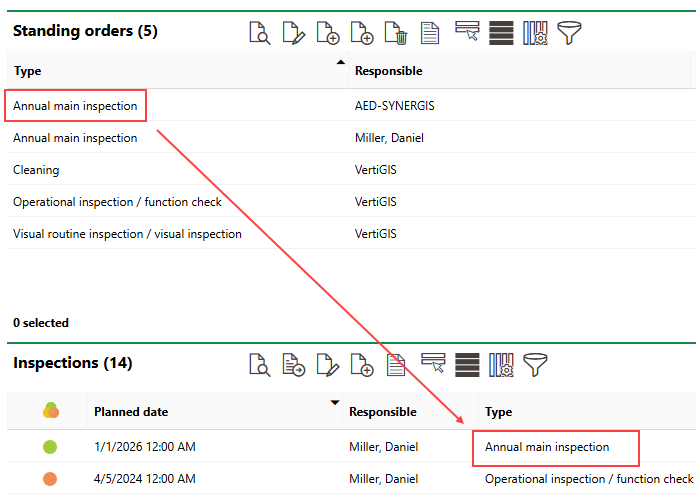
Inspection Generated by New Interval
Field |
Description |
|---|---|
Type |
The inspection template for the interval. Selectable options are saved in the Type of Inspection catalog and contain the frequency associated with inspections generated by the interval (for example, annually or weekly) and the current billing rate (or tariff). |
Tariff |
The billing rate for inspections generated by the interval. VertiGIS FM populates this field with the current tariff associated with the Type of Inspection catalog entry selected in the Type menu. |
Responsible |
The employee or contact who will be assigned inspections generated by the interval. By default, the user signed in to the application is selected in this field. |
Area [m2] |
The area in square meters covered by the inspection. By default, VertiGIS FM populates this field with the Area (Entered) in the functional unit's details. |
Planned costs/unit [cost/m²] |
The cost of the work per m2 of the area associated with inspections generated by the interval. The value is associated with the catalog entry selected in the Type field. |
Planned time/unit [h/m²] |
The amount of time per m2 it will take to complete inspections generated by the interval. The value is associated with the catalog entry selected in the Type field. |
Planned costs [costs] |
The annual planned costs for inspections generated by the interval. This value is calculated by the following algorithm: Area [m2] × Planned costs/unit [cost/m²] × Appointment current fiscal year |
Planned time [h] |
The annual working time for inspections or orders generated by the interval. This value is calculated by the following algorithm: Area [m2] × Planned time/unit [h/m²] × Appointment current fiscal year |
State |
The current state of the interval. The interval will only generate inspections if its State property is Active. An interval's State property is Active when the current date is between the dates in the From and Until fields in the interval details. |
Mode |
Whether the interval is active. The interval will not generate inspections if you select Deactivated from this menu. |
Interval |
How frequently inspections generated by the interval must be completed. This field is populated based on the intervals saved in the Type of Inspection catalog entry selected in the Type menu and the functional unit's Service Level property. |
Appointment current fiscal year |
The number of inspections that will be generated in the current fiscal year. This number is used to calculate the annual costs and planned time for inspections generated by the interval. |
From |
The date from which the interval is valid. |
Until |
The date until which the interval is valid. VertiGIS FM populates this field with the date in the Until field for the current tariff associated with the catalog entry selected in the Type field. |
Appointment |
Whether the interval will generate inspections. If you leave this check box unselected, the interval will not generate inspections. |
Basis for previous target date (otherwise execution) |
A check box that, if selected, means that the Planned Date of subsequent inspections generated by the interval will remain separated by the amount of time specified in the interval (for example, annually, monthly, or weekly), regardless of the first inspection's completion date. For example, if an interval dictates that inspections should occur Annually, •if the Basis for previous target date (otherwise execution) check box is selected, and the most recent inspection has a Planned Date of April 1, 2025, but is completed on April 5, 2025, the next inspection generated by the interval will have a Planned Date of April 1, 2026. •if the Basis for previous target date (otherwise execution) check box is not selected, and the most recent inspection has a Planned Date of April 1, 2025, but is completed on April 5, 2025, the next inspection generated by the interval will have a Planned Date of April 5, 2026. |
Description |
Additional notes regarding the interval. |
Service Level
An interval will not generate inspections or orders for a functional unit unless you have assigned it a property in the Service Level menu in the functional unit details. Selectable options (often High, Medium, and Low) are saved in the Service Level catalog.
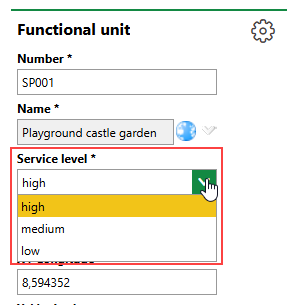
Service Level Menu in Functional Unit Details
The selected service level corresponds to a time interval in the Type of Inspection entry associated with the interval.
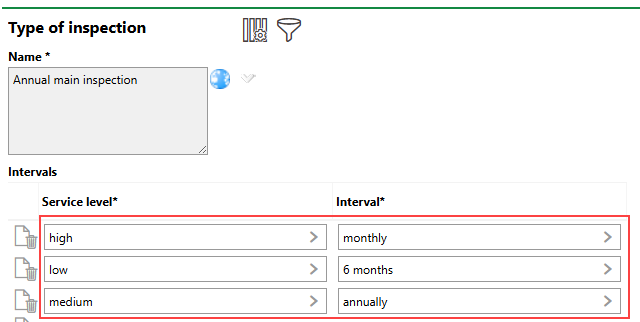
Service Levels Associated with Type of Inspection
The interval will generate inspections or orders according to the frequency associated with the selected service level. Using the data outlined in the example above, VertiGIS FM will create an interval for "Annual Main Inspection" that generates an inspection every 6 months. Intervals can be seen in the Standing Orders section on the functional unit's details page.
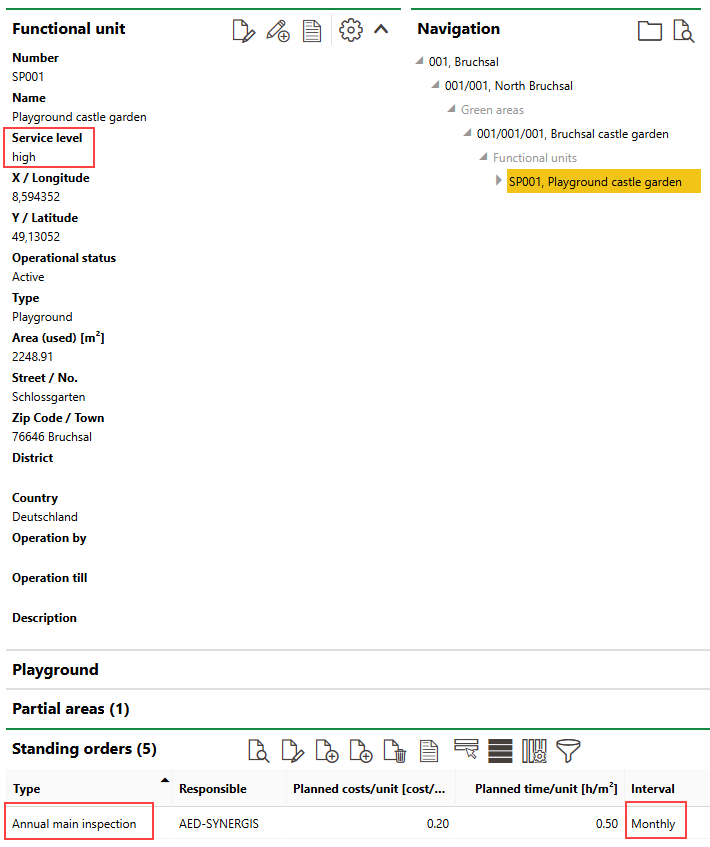
Inspection Interval for Functional Unit
Create an Order Interval
To create an order interval for a functional unit, an entry that specifies how often the interval should generate inspections (for example, monthly, every 6 months, or annually) and the billing rate associated with the inspection must exist in the Type of Maintenance Order catalog. You must also assign the functional unit a service level property.
You can create an interval for a functional unit on the functional unit's details page.
To Create an Order Interval
1.Navigate to the details page for the functional unit for which you want to create an order interval.
2.Expand the Standing Orders section and click the Add Inspection (![]() ) icon.
) icon.
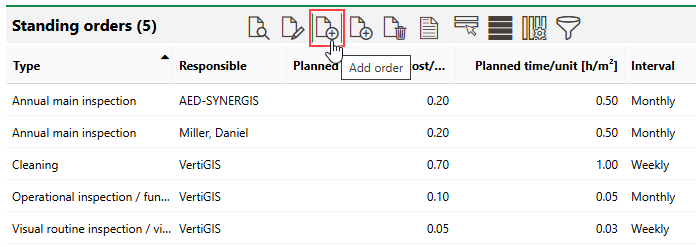
3.Click the > in the Type menu and select the template whose data you want to generate orders based on. Selectable options are saved in the Type of Maintenance Order catalog and contain the frequency associated with orders generated by the interval (for example, annually or weekly) and the current billing rate (or tariff).
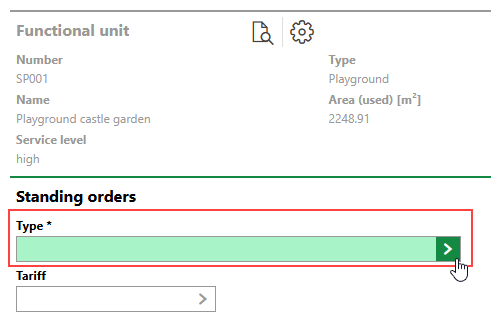
VertiGIS FM populates the Tariff field with the current billing rate for the entry selected in the Type field.
4.In the Responsible field, select the user to whom orders generated by the interval should be assigned. By default, the user signed in to the application who is creating the interval is selected.
Refer to Order Interval Details for descriptions of all form fields.
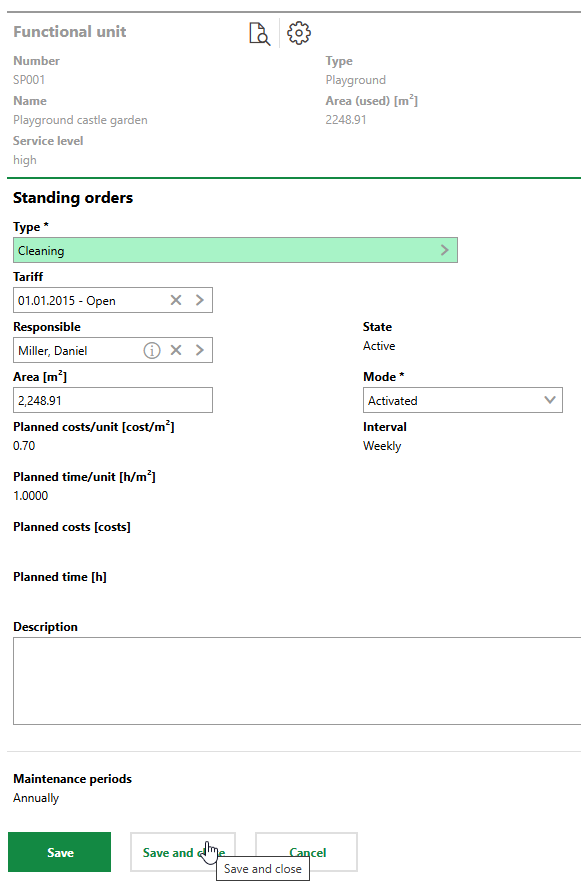
5.Review the information in the Standing Orders form and then click Save or Save and Close.
The new interval is now listed in the Standing Orders section on the functional unit's details page. If the interval's Mode property is set to Activated, orders generated by the interval will appear in the Orders section.
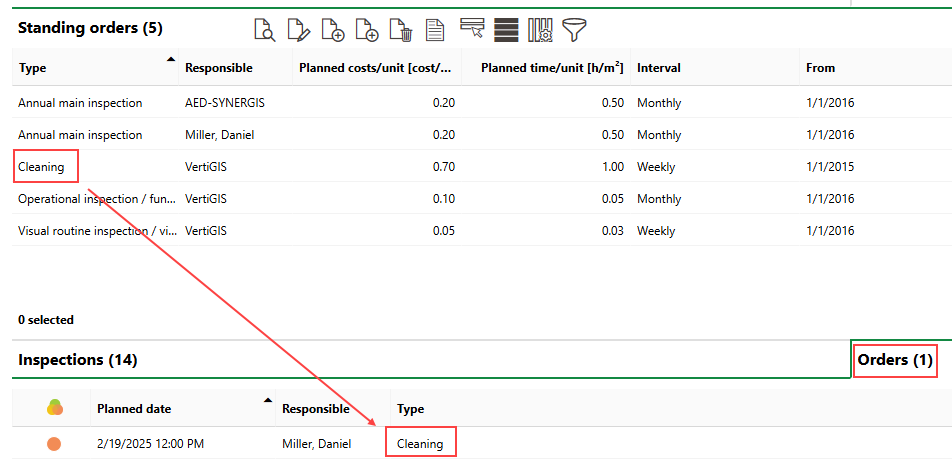
Order Generated by New Interval
Field |
Description |
|---|---|
Type |
The order template for the interval. Selectable options are saved in the Type of Maintenance Order catalog and contain the frequency associated with orders generated by the interval (for example, annually or weekly) and the current billing rate (or tariff). |
Tariff |
The billing rate for orders generated by the interval. VertiGIS FM populates this field with the current tariff associated with the Type of Maintenance Order catalog entry selected in the Type menu. |
Responsible |
The employee or contact who will be assigned orders generated by the interval. By default, the user signed in to the application is selected in this field. |
Area [m2] |
The area in square meters covered by the order. By default, VertiGIS FM populates this field with the Area (Entered) in the functional unit's details. |
Planned costs/unit [cost/m²] |
The cost of the work per m2 of the area associated with the order generated by the interval. The value is associated with the catalog entry selected in the Type field. |
Planned time/unit [h/m²] |
The amount of time per m2 it will take to complete orders generated by the interval. The value is associated with the catalog entry selected in the Type field. |
Planned costs [costs] |
The annual planned costs for orders generated by the interval. This value is calculated by the following algorithm: Area [m2] × Planned costs/unit [cost/m²] × Appointment current fiscal year |
Planned time [h] |
The annual working time for orders generated by the interval. This value is calculated by the following algorithm: Area [m2] × Planned time/unit [h/m²] × Appointment current fiscal year |
State |
The current state of the interval. The interval will only generate orders if its State property is Active. An interval's State property is Active when the current date is between the dates in the From and Until fields in the interval details. |
Mode |
Whether the interval is active. The interval will not generate orders if you select Deactivated from this menu. |
Interval |
How frequently orders generated by the interval must be completed. This field is populated based on the intervals saved in the Type of Maintenance Order catalog entry selected in the Type menu and the functional unit's Service Level property. |
Appointment current fiscal year |
The number of inspections or orders that will be generated in the current fiscal year. This number is used to calculate the annual costs and planned time for orders generated by the interval. |
From |
The date from which the interval is valid. |
Until |
The date until which the interval is valid. VertiGIS FM populates this field with the date in the Until field for the current tariff associated catalog entry selected in the Type field. |
Appointment |
Whether the interval will generate orders. If you leave this check box unselected, the interval will not generate orders. |
Basis for previous target date (otherwise execution) |
A check box that, if selected, means that the Planned Date of subsequent orders generated by the interval will be separated by the amount of time specified in the interval (for example, annually, monthly, or weekly). For example, if an interval dictates that orders should occur Annually, •if the Basis for previous target date (otherwise execution) check box is selected, and the most recent order has a Planned Date of April 1, 2025, but is completed on April 5, 2025, the next order generated by the interval will have a Planned Date of April 1, 2026. •if the Basis for previous target date (otherwise execution) check box is not selected, and the most recent order has a Planned Date of April 1, 2025, but is completed on April 5, 2025, the next order generated by the interval will have a Planned Date of April 5, 2026. |
Description |
Additional notes regarding the interval. |
Maintenance period |
The period(s) of the year during which the interval will generate orders. Selectable options are saved in the Maintenance Period catalog and associated with the entry selected in the Type field. |
The order interval will not generate orders unless the functional unit is assigned a Service Level property. Refer to Service Level.
Interval Catalogs
Refer to the table below for a full list of catalogs in which you must enter data to establish maintenance intervals for green areas and partial areas.
VertiGIS FM Greenspaces Maintenance Catalog
Catalog |
Description |
|---|---|
Stores the time intervals (for example, "every 1 week," "every 6 months," or "every 1 year") that can be associated with service levels in Type of Inspection and Type of Maintenance Order entries. |
|
Stores annual periods (for example, June 1 to August 31) that can be assigned to Type of Maintenance Order entries. Orders are only generated during the maintenance periods assigned to the order's Type of Maintenance Order catalog entry. |
|
Stores names for service levels (for example, High, Medium, or Low) that can be associated with intervals in Type of Inspection and Type of Maintenance Order entries. Entries saved in this catalog can be selected from the Service Level menu in a functional unit's details to specify how frequently VertiGIS FM should generate inspections or orders for the functional unit. |
|
Attached to inspection intervals for functional units. Specifies how often inspections are generated and the billing rate associated with the inspection. |
|
Stores and connects all data for required to establish maintenance intervals for orders for functional units and partial areas. In each entry, you must specify a maintenance period (assignable options saved in the Maintenance Periods catalog), which service levels (stored in the Service Level catalog) are associated with which intervals (stored in the Interval catalog), and billing information for orders associated with the catalog entry. |
Manually Create Inspections
If a functional unit requires a single inspection or order that does not need to recur on an ongoing basis, you can manually create a single inspection.
Manually Create an Individual Inspection for a Functional Unit
You can manually create an inspection for a functional unit in the Inspections section on the functional unit's details page.
To Manually Create a Functional Unit Inspection
1.Navigate to the details page for the functional unit for which you want to manually create an inspection.
2.Expand the Inspections section and click the Add Another Inspection (![]() ) icon.
) icon.

3.Enter any relevant details for the inspection. You do not need to select a template from a catalog. Refer to Inspection Details for form field descriptions.
Not all fields in the Inspection Details table are relevant to manually created orders.
4.Click Save or Save and Close.
Create an Order Based on Damage Entries
In VertiGIS FM Greenspaces, you can also create new orders using existing damage entries that have been recorded in the system. Employees assigned the order can see a link to the originating damage entry when they open the order.
By following this procedure, you can create multiple orders for multiple damage entries at the same time. Each order must have the same Type of Maintenance Order template selected in the Type menu.
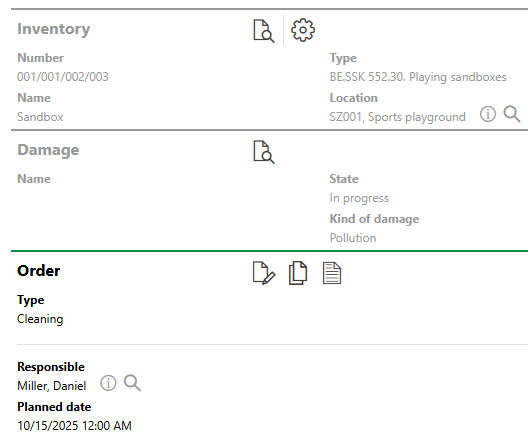
Order Created Based on Damage Entry
To Create an Order Based on Damage Entries
1.Navigate to the Playground Management search page.
2.Under Objects, click Damage.
3.Select the damage entries for which you want to create new orders, and then click the Order Creation (![]() ) icon. A new order will be created for each damage entry you select, but each one must have the same Type of Maintenance Order selected.
) icon. A new order will be created for each damage entry you select, but each one must have the same Type of Maintenance Order selected.
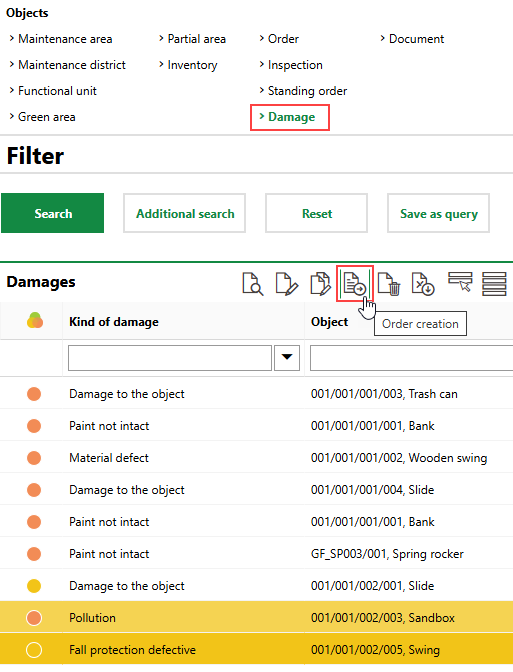
4.Click the > button in the Type menu and select an order template. Selectable options are saved in the Type of Maintenance Order catalog.

5.Click Apply to All. New orders will be created for each damage entry listed in the Adopted Elements section.
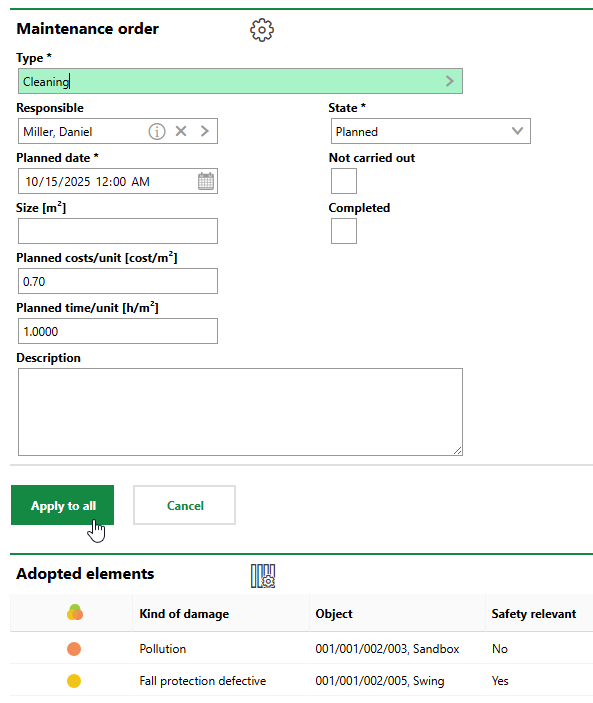
6.Click OK.
The new orders are added to the database.
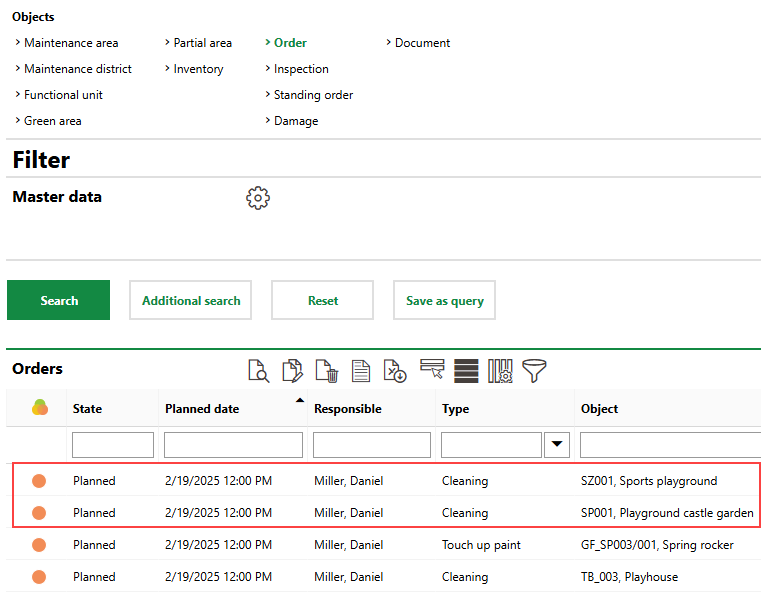
New Orders Shown on Playground Management Search Page
You can also access the orders when viewing the damage entry, when viewing any inspections associated with the damage entry, or from the Orders section on the details page for the data object (green area, partial area, functional unit, or inventory item) associated with the damage entry.
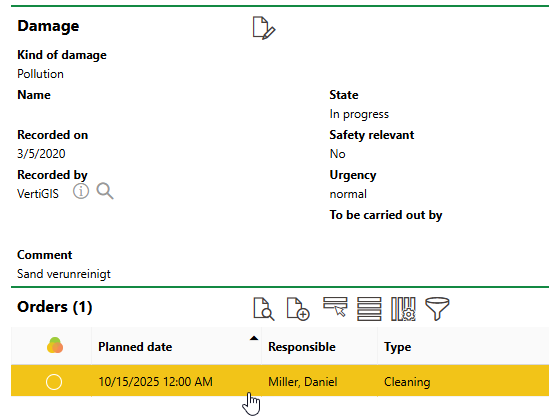
Opening Order Created Based on Damage Entry